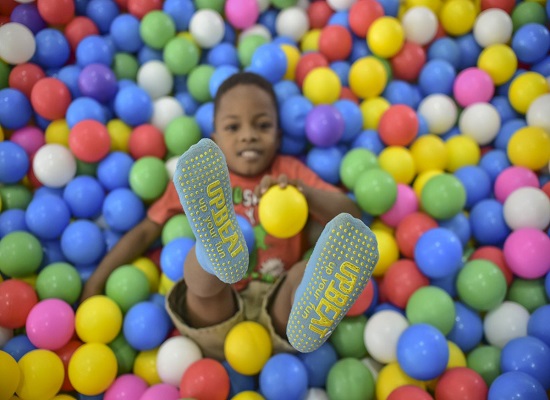
 Raising a special needs child isn’t so easy.
Raising a special needs child isn’t so easy.
In this article, you will read top tips and coping mechanisms of other parents of special needs kids.
1. Enjoy Your Child
As a parent of a kid with special needs, it is expected that you will be over-scheduled and busier than most. However, while doing your best to meet up with everything on your calendar, it’s also important to make time to laugh, play, be carefree, and just enjoy spending time with your special kid. Read to them, snuggle with them, and just focus on having a good time.
Accept your child for who they are, and love them unconditionally. Whatever your kid’s special condition might be, be it down syndrome, epilepsy, autism, etc. bear in mind that it is only one aspect of your child, and so, shouldn’t define him or her.
Acknowledge the qualities your child possesses instead of what focusing on what they don’t. see him or her first and foremost as a child, rather than someone with special needs. Be intentional about focusing on the present because as such a parent, you are going to face different challenges related to that child at different stages. The power of positive thinking and unconditional love for your child will be your greatest allies.
When you’ve made up your mind to become this intentional about enjoying your child, it would become easy to be their strongest advocate—because they will need one—around family, friends, school, and the community at large.
Enjoy spending time with them; remember: how you deal with this challenge sets the tone for many aspects of your child’s future. When you look back after many years, you want to feel proud of your role in developing the perfectly happy person your child will become.
2. Do a lot of advanced learning
Know everything you can about your special child’s condition. Read journals. Skim through websites. Refuse to be comfortable with the bits the doctors and nurses share with you. Ease into the wealth of information that’s available by reading. Find communities of other parents (online or offline) who share their experiences and success stories at relevant organisations and support groups. You will feel more in control when you’re well-informed.
Thanks to modern-day technology, you can find a wealth of reliable information online about practically every special condition out there. Here are some websites that offer useful information on topics around kids with special needs, ranging from muscular dystrophy, multiple sclerosis, epilepsy, autism, Down syndrome, dyslexia, learning disorders, oppositional defiance disorder, etc.
READ ALSO: Milestone Red Flags For Toddlers
3. You Won’t Always Get It Right
The sooner you accept that you will not always be right, the better for your mental disposition. Many of the choices you are compelled to make have no right answer, just the lesser of the hard and painful wrong choice. You will do your best but you won’t always get it right, regardless of the number of sleepless nights you spend agonizing over how to handle a situation. Acknowledge that you will screw things up sometimes despite the very best of intentions. When this happens, take succor in the thought that you were only doing what you thought best for your child, and quit beating yourself up about it. Remember, many of the decisions you will be required to take have no right answers, plus you will seldom have the time to think it through since most of them are on the spot decisions.
4. Trust your instincts.
No one knows your child better than you do. Doctors, nurses, teachers, therapists are all great resources but if you don’t feel your child’s needs are being met, or that you’re being heard, it’s very reasonable to seek a second opinion. Don’t be afraid to fight for your child and their needs. While these professionals are experts in their respective fields, you are the expert on your child.
5. You are not alone.
There may not be anyone else with the same cast of symptoms as your child, but there are people with similar challenges. A lot, actually. Find those people; they will be a great deal of support in more ways than you can imagine.
There are bound to be some ‘not-so-good days’ when all you need to get you back on your feet is a subtle reminder that you are not alone. Social media is a great way to make such needful connections.
6. Don’t lose yourself.
You are many things, and being the parent to a child with special needs is only a part of your identity. Do not let it become all of there is to you. If you focus all of your life, all of your contacts, all of yourself around your child and their needs, who you are can easily get lost. Find things in your life you enjoy doing—reading, vlogging, arts and crafts, etc. exercise and rest as much as you can. If possible, enroll your child in a school for children with special needs and go on to pursue your own career. Discuss turns with your spouse to do solo shifts so that you’ll get some respite. The more balanced, relaxed, and recharged you are, the more patient, caring, and proactive you will be when you perform your caregiving responsibilities. You too deserve to be cared for.
7. Don’t let typical parents get you down.
I too am a mum. So, I know how hard it can be to hear from parents that their child six months younger than yours is walking and yours isn’t.
The 3-year old is riding a bicycle in the yard now, and yours can’t; probably never will.
Try to remember that these people lack the context that you are constantly embedded in.
Explain, teach, be patient, raise awareness amongst those who just don’t get it, and possibly distance yourself from the mean one saying spiteful words on purpose.
Bear in mind that typical parents deserve the right to brag too and laud their pride at their child’s accomplishments. Just don’t let it get to you, especially if they mean no harm.
8. Celebrate the little victories
Brag about those accomplishments that might seem small to others but are huge leaps for your kid!
They develop on their own clock, they learn many skills late and some they never master, and that’s okay too.
A word, a sentence, a smile, a gesture; whatever that milestone may be, share that small victory with those who love you and your child, and celebrate it with your child.
Find more tips on parenting here.



